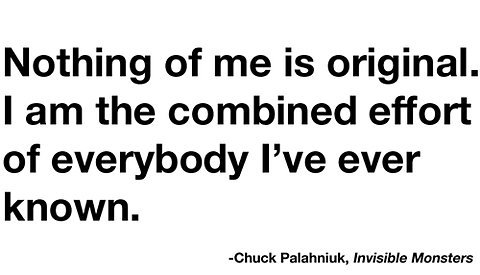To understand deconstruction theory we need not go into much detail. The concept, as Eagleton has so eloquently outlined it, is quite simple. If you are a creative writer you know that all "works" are in actuality "texts," in that no text has a distinct meaning. Writing and all its products are completely subjective. It is because of this theory that all questions can be asked of texts and it is also why there are no right or wrong answers when it comes to the exact meaning of texts. The truth of the matter is, according to Derrida and Barthes, there is no one central meaning. Literature is plural: there is a multiplicity of meanings which can be derived from any one specific text.
There are many questions as to what exactly a text is, however, I find that things that are constructed like a narrative to be a text. Therefore, a person is easily a text and can be deconstructive. Our lives are stories after all, are they not?
Taking into consideration the epitaph at the beginning of the journal, because my entire being is constructed through the language I speak (as I have mentioned in previous entries concerning Lacan and Saussure), my very being can be deconstructed. Paul de Man considered language to be "ineradicably metaphorical"(126), and it is because of this that I turn to Lakoff and Johnson's "Metaphors We Live By". To say that I (Ashley Jean) am "in love" can be read as the following:
- I am held hostage by love
- I have been capture by love
- I am immersed in love
- I am exploring a country whose name is "love"
Consider this:

This furthers the idea in deconstructionalism that "there is no such thing as literary originality, no such thing as the first literary work: all literature is intertextual"(119). And because persons are constructed through language, then we are not original. If this were true, no one person could identify themselves through another person as one so often does. You could not identify yourself through me if we are both in fact distinct and original. We are made up of one another and thus carry and intertextuality within us. We are the re-workings of generations that have preceded us. But it is because of this which gives our characters in life dimension, and a "writable" text. People can construct our intentions through a series of past events etc. and they might never come to the original intent because no text carries an original intent.
And I have finally drawn my conclusion that what I have stated here, could entirely be made up. Perhaps I have not meant what I have said and have in fact have meant it in another way in which you, the reader, are currently trying to re-write. It is because of what you have read here that makes you think otherwise, which means you are now made up of me and have become intertextual. Others who listen to your text of life will repeat this process. The beauty of if it all is no one person can be right about you, for another will read you differently.

Aside from my utter joy to see Palahniuk mentioned in a scholarly post, I have to say that deconstruction is one of my favorite theories so far because it is so liberating. It takes away from this favoring of a reading or interpretation of a work over some other reading. In a way, it opens up texts (and people?) to a variety of readings and interpretations.
ReplyDeleteIt also complicates a text and takes away the notion of Truth. We can only understand so much. Even then, we should never be too sure.
Great post!